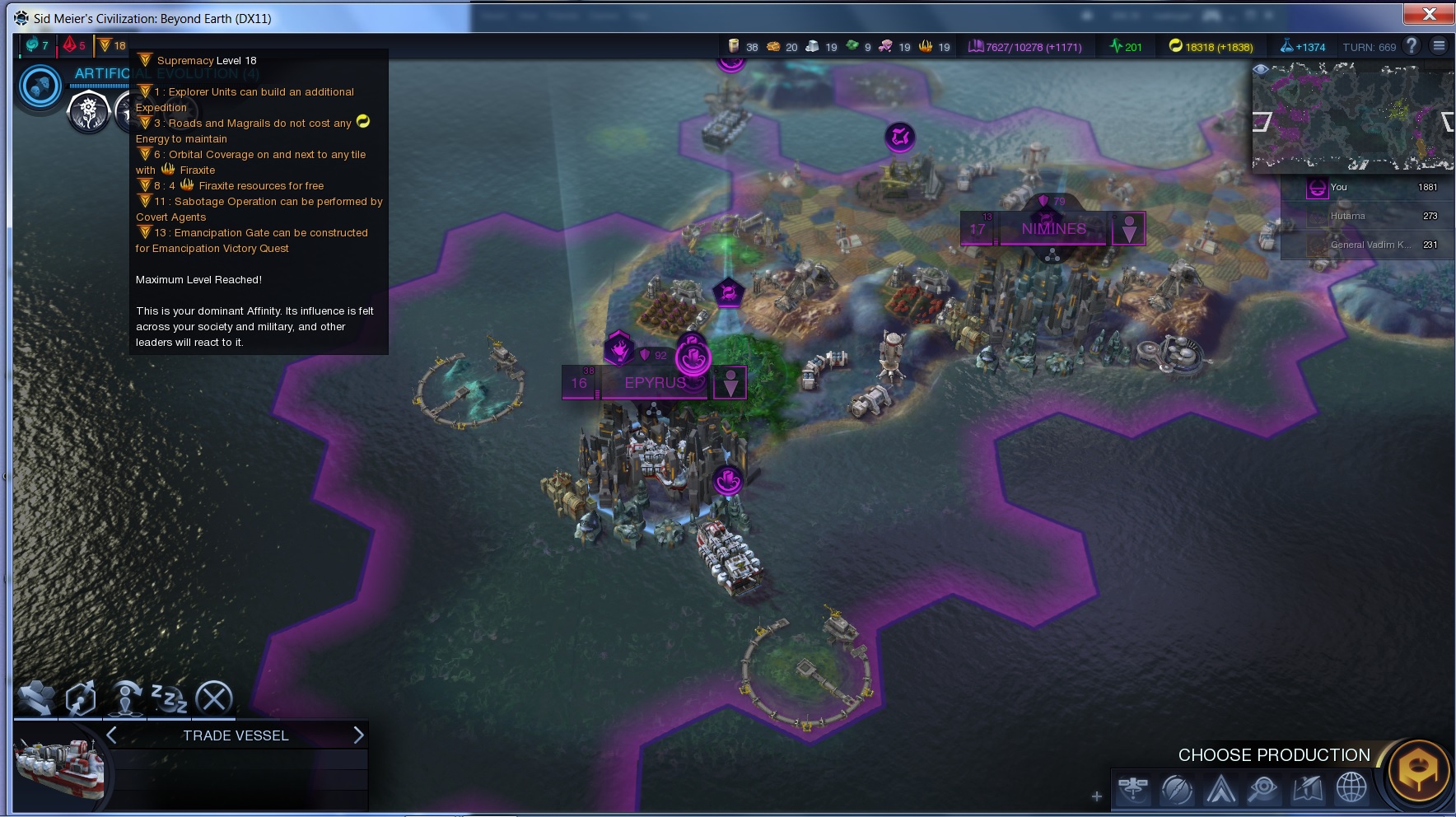Turn of the century.
Humanity hangs on a thread. After the calamity vaguely known as "The Great Mistake" forces us to recognize that our society on Earth is unsustainable, we realize that one of our last chances of survival is to search the stars for another habitable planet on which, we hope, our mistakes are not repeated. This rebirth of the human race by way of necessity forms the context of Sid Meier's Civilization: Beyond Earth, a standalone reconstruction of Civilization V and a vision of the future which brings into focus the possibility of extraterrestrial repopulation.
For better or worse, Beyond Earth rises and falls in comparison to Civilization V, improving upon several aspects of the base game but also retaining a few regrettable mechanics as well. On the outset, religion has been removed from the equation, despite the priest in the gorgeous opening cinematic (posted below), and the world council from Brave New World has been nixed as well. The historic world leaders like Napoleon and Gandhi have been replaced by CEOs of multinational corporations and generals of international alliances. Most of the elements in Beyond Earth will be familiar to Civilization fans, but at least half of them have been tweaked and redesigned to the point that Beyond Earth can only be acknowledged as an evolved beast.
Beyond Earth generally works the same way as you would expect from a 4X strategy game, challenging you to build a civilization from scratch, but this time on an unknown alien planet. Before landing on the surface, you'll begin by selecting the difficulty (out of six), choosing the game speed (out of four), the general terrain of the world, and most importantly, the various passive bonuses of your civilization based on your sponsor, colonists, spacecraft, and cargo. Military-minded players will likely choose Brasilia for enhanced strength in melee combat and the Lifeform Sensor to locate Alien Nests on the planet, while culturally-minded players might select Franco-Iberia for extra technologies and Artists for colonists who provide culture and health.
After selecting the optimal spot to establish the capital of your civilization, hopefully surrounded by tiles with bountiful yields for food and strategic resources, you'll need to guide your civilization toward one of the five victory conditions. The simplest is Domination where your military captures every other player's capital city, while the most universal Contact victory has you decode a signal and build an energy-sapping beacon that contacts a benevolent, advanced alien race that used to populate the planet. Whatever you choose, you'll need to expand your territory, construct buildings for more resources and better city defenses, and luckily produce wonders that only one civilization can own at a time.
Three of the five victory conditions in Beyond Earth focus on building a Planetary Wonder based on the three new affinities—Supremacy, Purity, and Harmony—which have more impact than the three Ideologies of Freedom, Autocracy, and Order in Brave New World that they're derived from. These affinities effectively represent varying reactions to the quintessential "man vs. nature" conflict… if we modify nature to include aliens. The Harmony path seeks to become one with the aliens on the planet, whereas the Supremacy path wishes to evolve the human race in order to dominate the aliens, and the Purity path rejects alien life altogether in the belief that humans should stay as they are. That said, there's no reason you can't play an aggressive Harmony build or a peaceful Supremacy build to throw off your opponents.
While you won't need to choose an affinity straight out of the gate, which allows you to disguise your true affinity at least for a handful of turns, the strength of your military is tied directly to your highest affinity. Reaching certain levels in each affinity will not only net you perks, but it will also give you the ability to upgrade your units for special traits and improved offense and defense. Thus, by quickly researching technologies aligned with your affinity and exploring progenitor ruins for free affinity levels, your military can easily conquer or defend against other civilizations.
This three-pronged affinity system naturally lends itself to conflict and support between civilizations, though helping another civilization who is moving toward the same victory condition as you are can cause conflict too. Beyond Earth supports the idea of building your affinities evenly, at least at the start, to earn the Level 1 perks of each affinity, which lowers the hostility of aliens, grants immunity of your very frail explorers from aliens, and gives your explorers another expedition unit so they can remain out in the field longer before heading back to base. Eventually, though, you'll need to pick one affinity to protect yourself from military advances, a point which makes me wish you could upgrade military units by having an even spread of affinities across the board.
Still, the flexibility in crafting the civilization to your parameters is commendable. Both the technology web and virtue trees give you the capacity to race down one particular route quickly or spread your efforts uniformly. Moving down one of the four virtue trees can be done in as little as seven virtues, though you'll be missing out on useful synergy bonuses for being a jack of all trades. The technology web, comprised of concentric ovals, has copious options for paths and allows you to easily skip technologies that you don't care for.
Aliens are a notable improvement as a substitute for barbarians, who were typically there for gold fodder in Civ V. While eliminating alien nests awards a small amount of energy, the currency in Beyond Earth, aliens are a far more dangerous threat. They can wreak havoc on your trade convoys and fragile explorers who are important in dispelling the fog over the world, finding resource pods, and excavating ancient ruins. They'll perceive any advance on their nests as an hostile act, and powerful siege worms can destroy tile improvements if they get too close. In other words, build the Ultrasonic Fence as soon as you can.
Attacking aliens, though, is mostly unavoidable. Doing so will incur the wrath of Harmony-based civilizations, but aliens, if left unchecked, can pillage your tile improvements and block tiles from being worked by your citizens. Sea creatures in particular will be pests for coastal cities. It's possible to become friendly with local aliens by including and protecting their nest into a city, but it's usually more difficult than it's worth, especially if the nest is out of a city's range. On a seperate but related note, I'm still not sure why a city can't work tiles outside of a three-tile radius.
There are plenty of other solid replacements and improvements as well in Beyond Earth. Instead of happiness in Civ V, health awards passive bonuses for reaching positive levels. Satellites produced from cities or found in resource pods can be launched into the orbital layer, granting better yields from tiles, raining down missiles upon enemies, and even allowing instant teleportation. Newfound quests provide direction for new players, give solid rewards toward victories, and modify buildings for customizable perks. Covert operations are available much earlier in the game, giving you far more agents over the long haul and allowing you to perform sinister operations like the dirty bomb if you've increased a city's intrigue level high enough.
Forming cities has been made slower too, so that players can't gobble up resources and territory so easily. Instead of forming cities immediately, colonists build vulnerable outposts that need time to grow, and colonists can't be produced without researching the Pioneering technology first. It's surely a controversial decision as it favors military conquest and protection, but it limits growth and gives you a chance to counter territory-grabbing tactics that might steal precious strategic resources.
However, stations which are meant to replace city-states don't offer much apart from trade and will even disappear from the map if no trade routes are made with it. Completing wonders don't feel as exhilarating either, since the art for them are merely blueprints and since the spoken quotes are original when they could have easily been drawn from famous scientists and sci-fi writers and philosophers. The descriptions of wonders and technologies in the Civilopedia, though, do expand on various transhumanist topics and current-day state-of-the-art technologies.
On top of that, several issues from Civ V have been left unaddressed. Diplomacy and trade between civilizations is limited, with the majority of discussion topics being hostile in nature and with the lack of trade agreements and research agreements as options. While the inclusion of alliances in trade makes sense and you can now earn favors in exchange for assistance, it's extremely tough to gauge what a "favor" will give you and there still is no indicator anywhere that lets you know whether an AI will accept a trade before you offer one. The AI also has an irritating habit of asking you to give away about a third of your science production for one measly favor, or asking you not to expand your territory into their area after they build a city right next to yours.
In fact, the lack of indicators unfortunately plagues the game throughout, not alerting you when someone forms an outpost or city, when your outpost becomes a city, what building has just been built in one of your cities, or when an annexed city is no longer under martial law. The tech tree doesn't update when a wonder has already been completed, and if a building has been given a more complicated perk through a quest, its description doesn't update in the production list.
Multiplayer, of course, is an entirely different beast where petty rivalries and irrational behavior run rampant, if just to throw opponents off their game and provoke them into making dumb moves. You'll need to master the makeup of your army and make sure that you don't spread your forces too thin. Players at war play in sequence with those who have lower total scores going first, so controlling your progress can make all the difference. Due to the low cost of producing units, even they've been upgraded through affinities, you can expect plenty of warfare. The lack of indicators and being unable to zoom out to see the entire map, though, strains the multiplayer experience unnecessarily.
Despite a few pre-existing flaws carried over from Civilization V, Sid Meier's Civilization: Beyond Earth evolves the franchise and has the potential to become an outstanding spin-off of its own. The redesign of barbarians, ideologies, tech trees, and social policies into their futuristic analogs holds both interest and depth, though the advent of the Endless series reveal several deficient areas in diplomacy and notifications. With luck, Firaxis will continue to explore Beyond Earth with additional expansions, because this is one offshoot that rightly deserves one more turn.
-
Strong contextual setting
-
Affinities far more integrated than Ideologies
-
Health, improved covert ops, and quests
-
Aliens much better than barbarians
-
...but difficult not to suppress and attack them
-
Satellites and orbital layer
-
Solid multiplayer
-
Lack of indicators
-
Diplomacy and trade still deficient
-
Some irritations with AI opponents
Sid Meier Civilization Beyond Earth
-
Aliens Blocking Tile Production, ARGH!!!
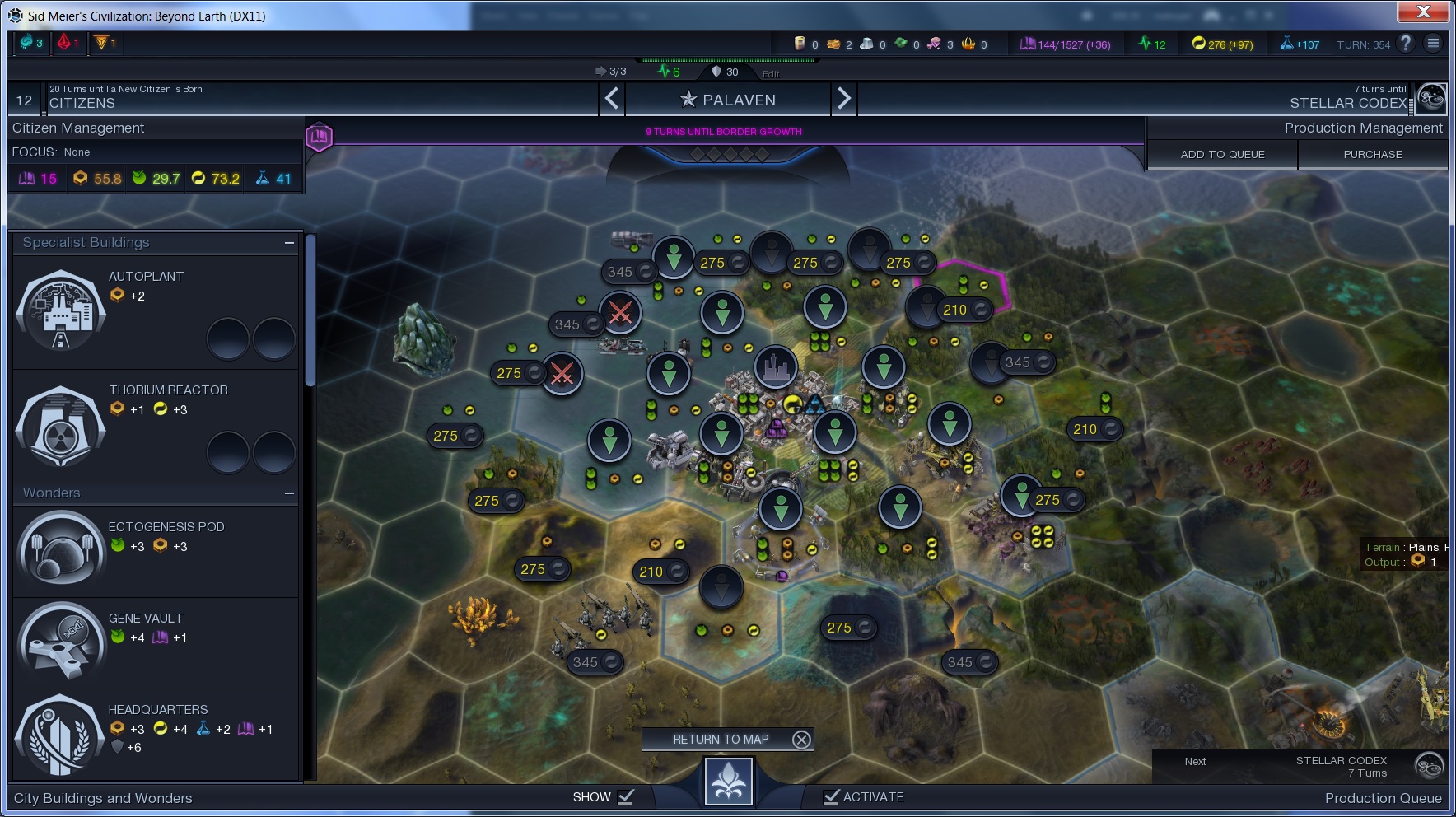
-
Ultrasonic Fence Keeps Aliens At Bay

-
Dealing With AI Opponents
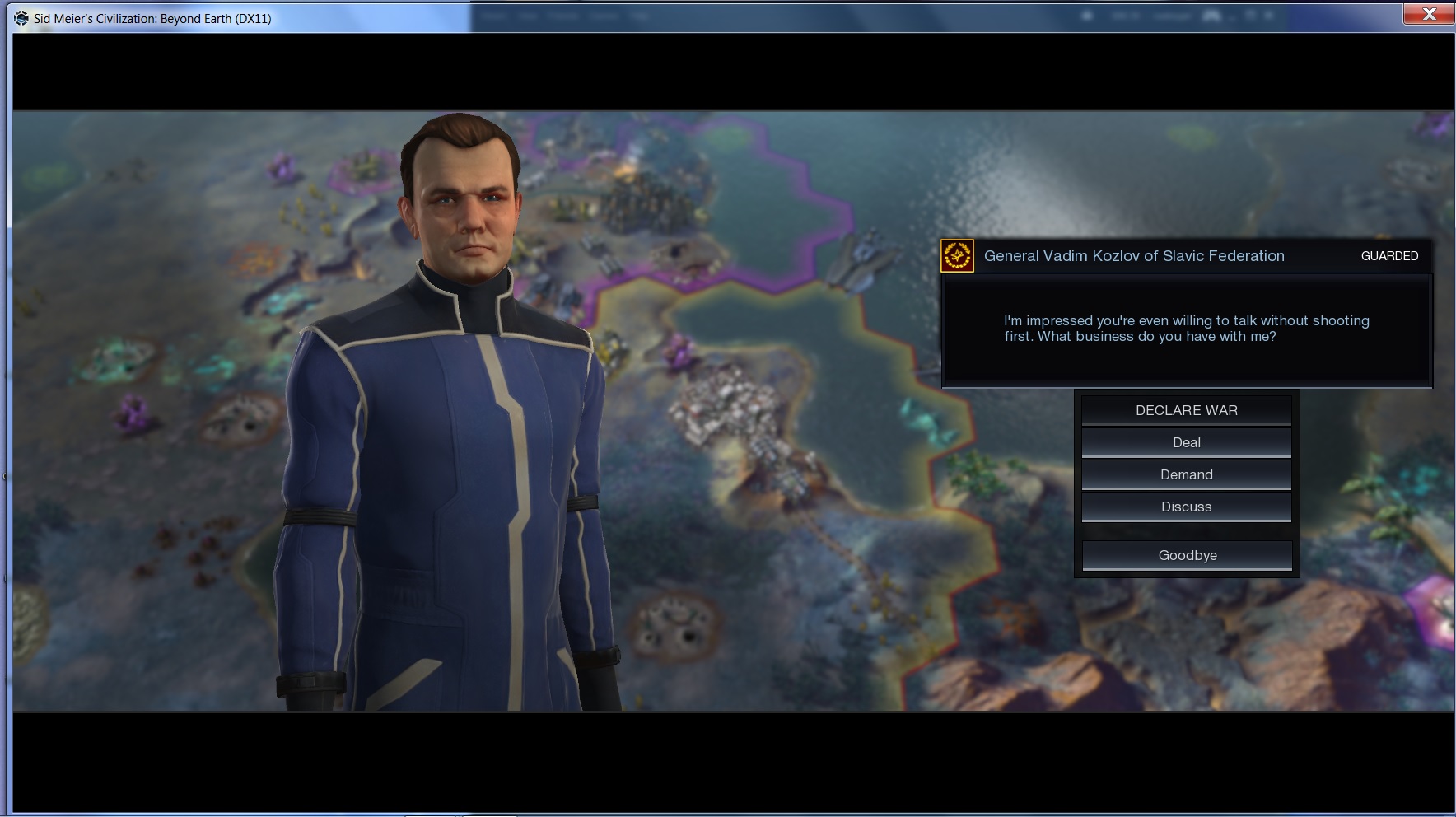
-
AI Condemns Me But Still Wants A Favor?
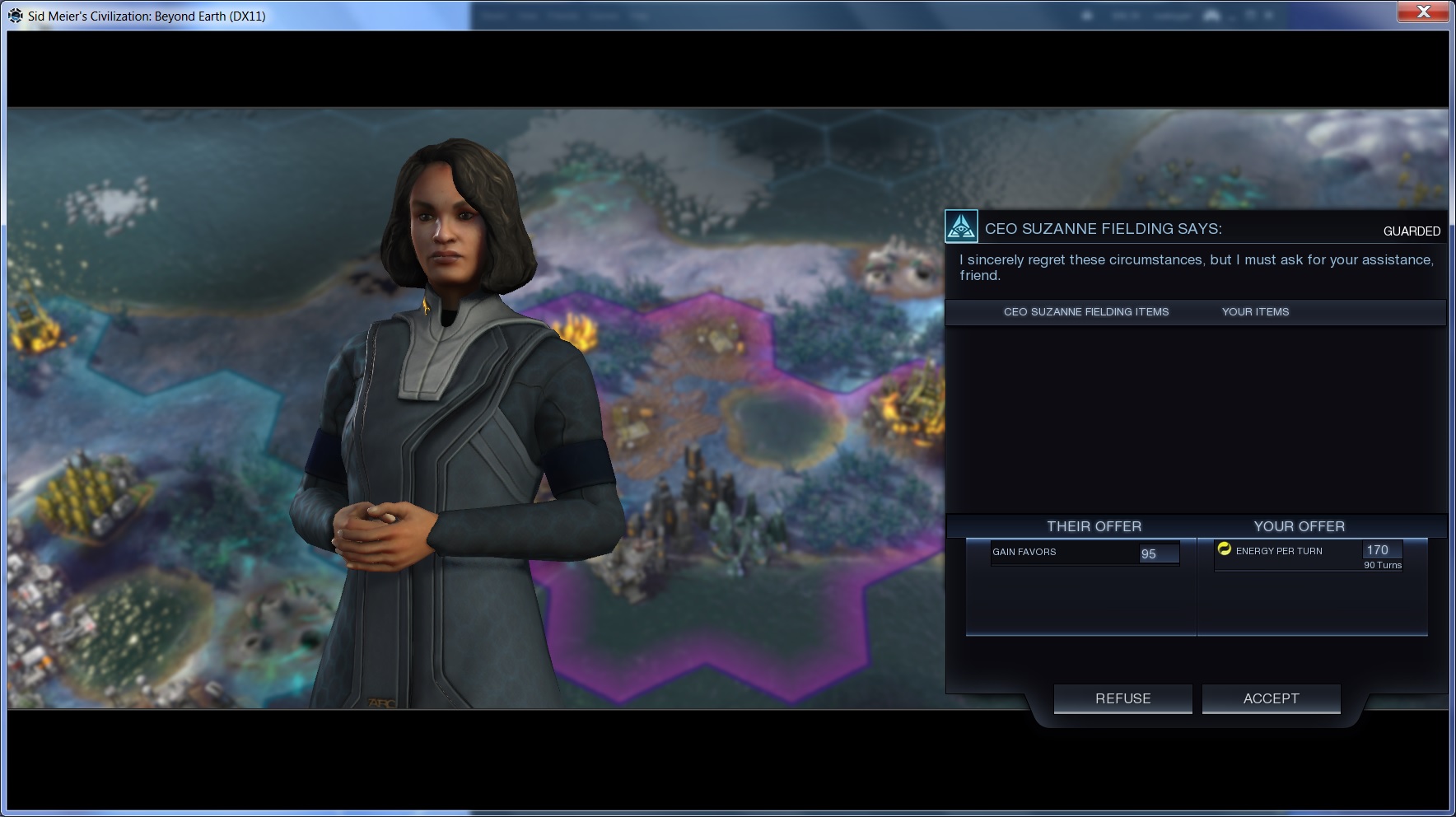
-
Diplomacy Overview
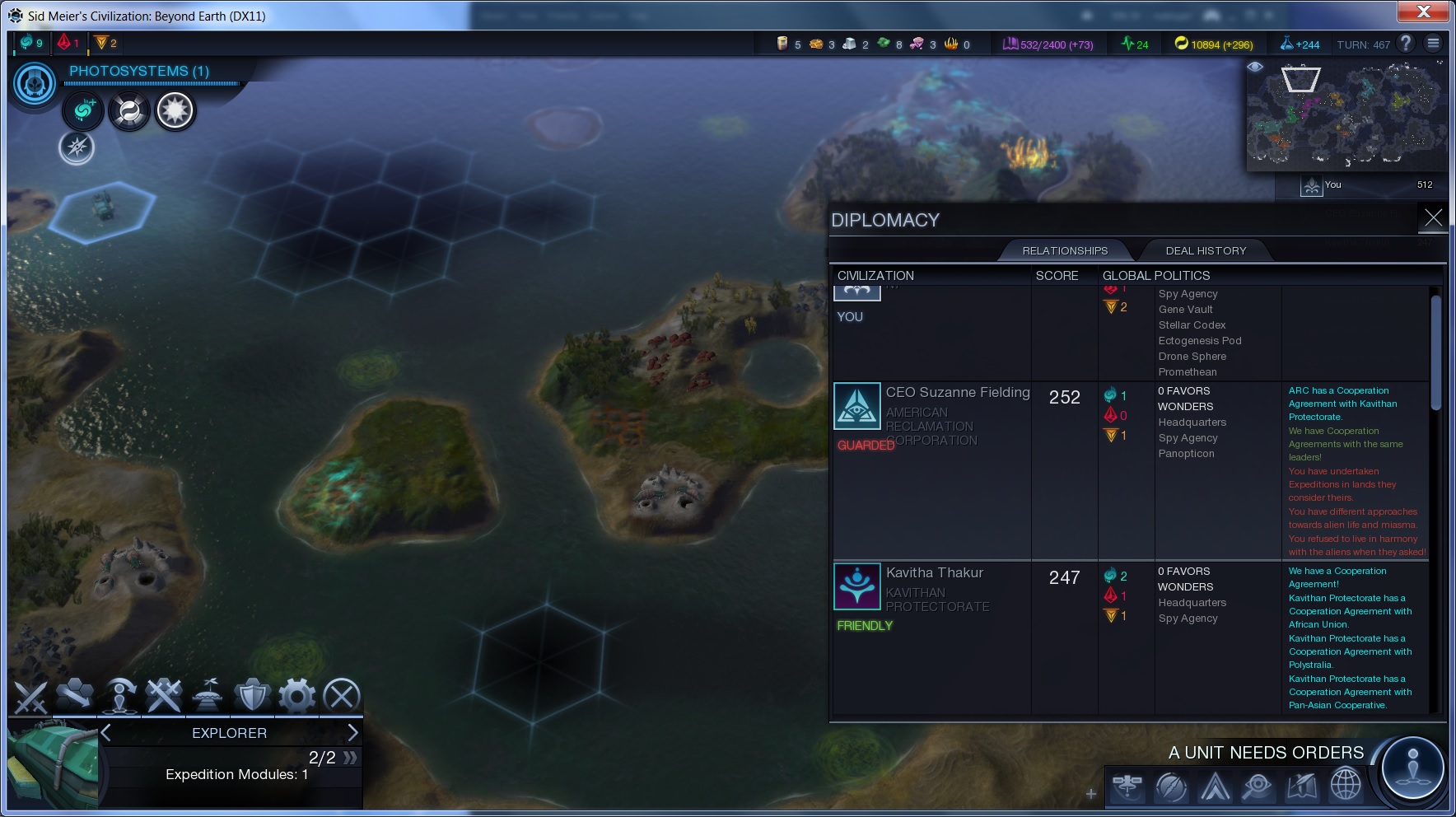
-
Yes, I Play As The Turians, Okay
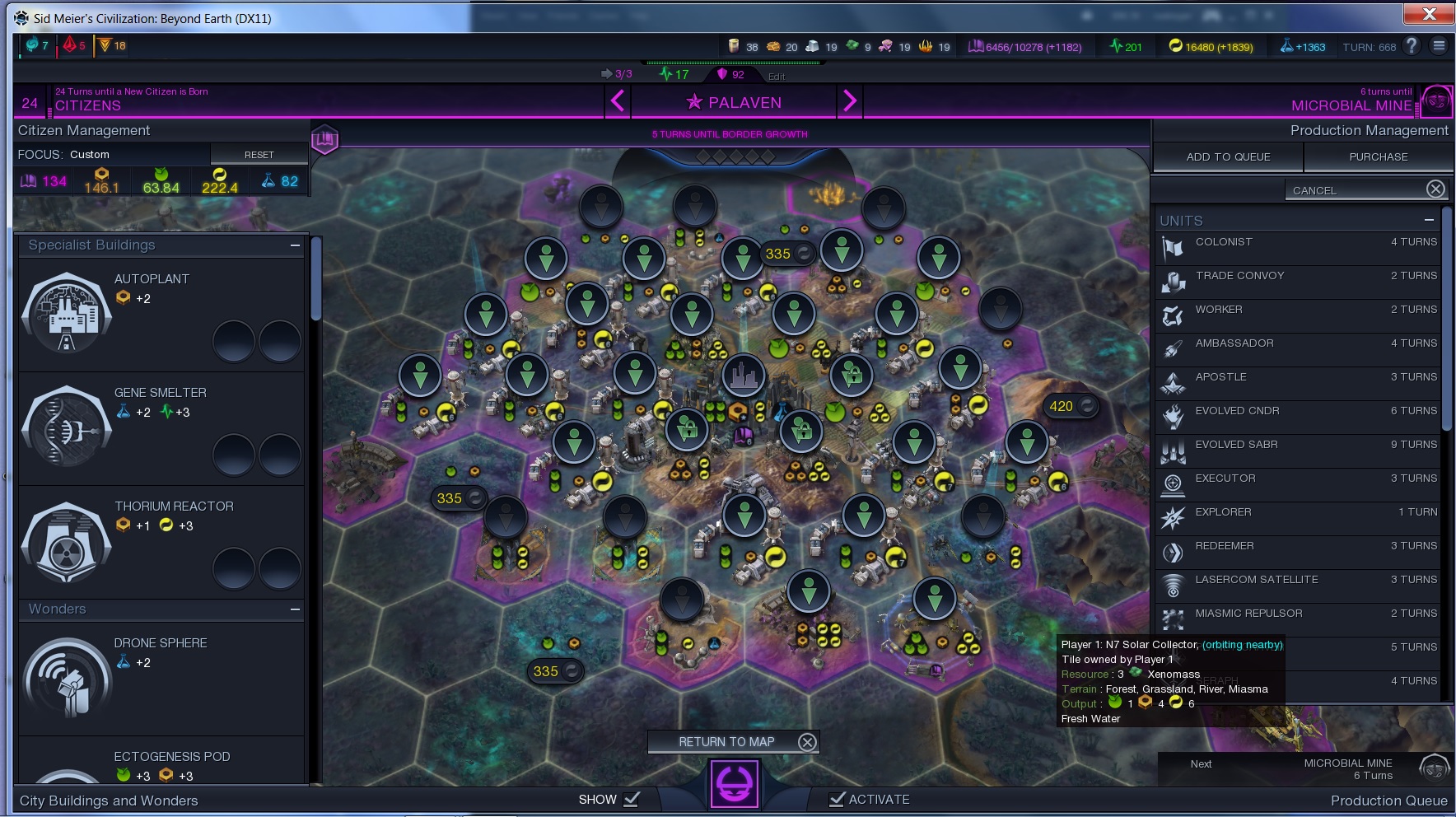
-
57 Science For 1 Favor?! Get Out Of Here!
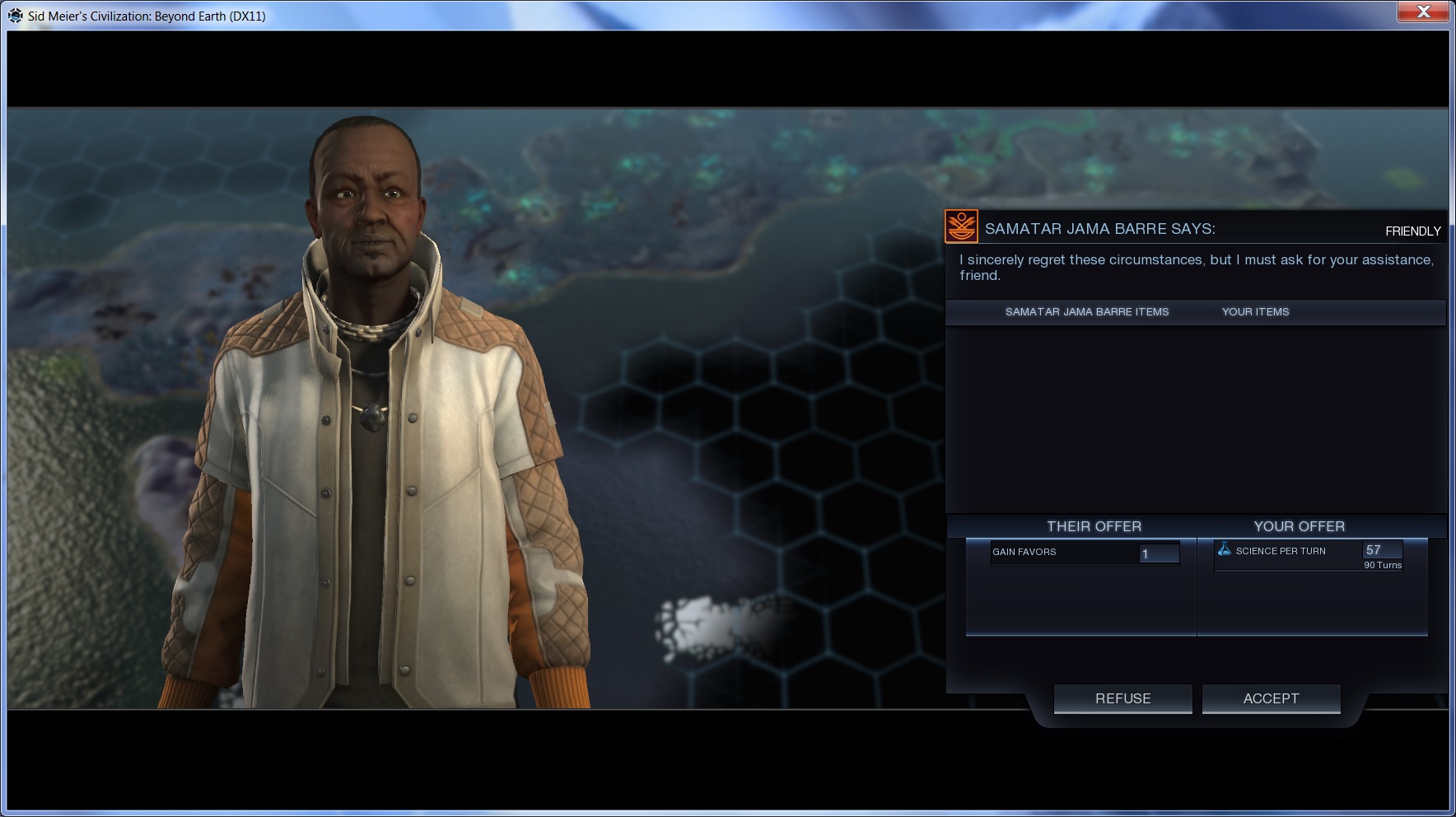
-
Camp Cascade Station Provides Good Trade
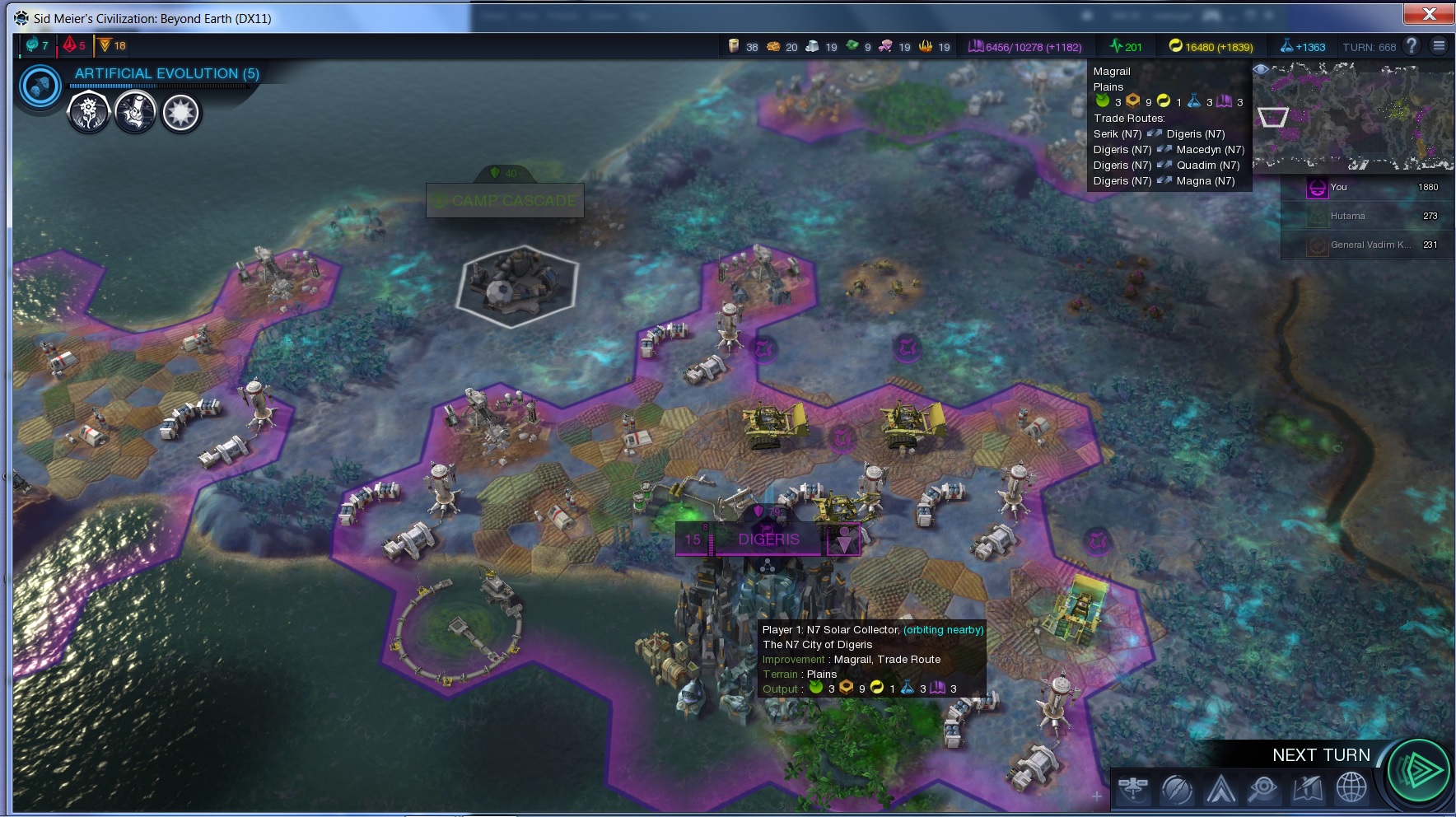
-
Supremacy All The Way
